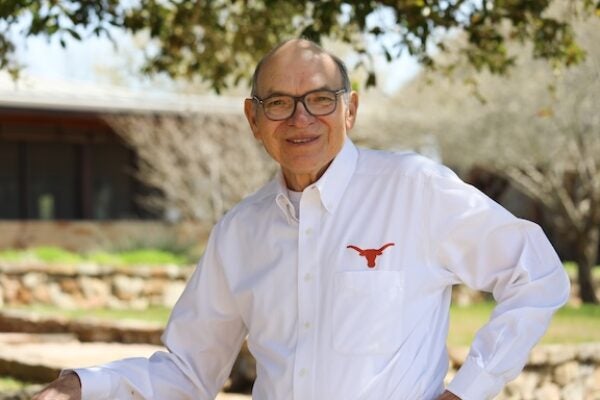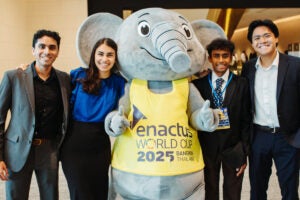Even at a young age, David Garza knew he wanted to be a doctor. According to Garza family lore, a very young David foretold his future when he accompanied his father on a visit to a tractor dealership near the family’s Rio Grande Valley ranch. “The owner looked at me and asked, ‘Well, son, what do you want to be when you grow up?’” David recalls. “And I said, ‘I’m going to go to The University of Texas and be a doctor.’”
Young David’s words were on the mark. After growing up and attending school in Edinburg, Texas, David earned two degrees from The University of Texas at Austin: a bachelor’s of science degree in pharmacy in 1970 and, years later, a law degree in 1996. He also had a long career as a cardiologist after receiving his medical degree from the University of California San Diego in 1974.
Looking back, David says his early inspiration probably stemmed from his admiration for the family’s physician, Dr. Vance Hoffmaster. “He was the kind of guy that automatically would be almost godlike in a little kid’s imagination,” David says. “And he had that big UT MD degree on his wall.”
But even more important, David says, was the encouragement and motivation he received from his parents, Porfirio and Emma Garza, who always understood the value of higher education and encouraged David and his two older sisters to pursue their academic goals. Now David is helping a new generation of students pursue their own goals while recognizing his parents’ influence on his life. He recently created the Porfirio and Emma Garza Scholarship in the College of Liberal Arts to offer support to high-potential Texas students from low- and middle-income families.
“I thought this was an opportunity to pay back and honor my parents,” he says.
The Importance of Education
David’s father Porfirio could trace his ancestry back to the colonial settlement of Mexico in the mid-17th century. He spent his early years on the family homestead before moving with his family to Raymondville, Texas, when he was 17. As a child he had been educated by itinerant teachers who traveled from ranch to ranch teaching local children, but this made for an inconsistent education; when Porfirio enrolled in the local school in Raymondville, he was assigned to the second grade. He soon left school to take on greater responsibilities at the family ranch, but David says his father always recognized the value of an education and the freedom it could grant.
David’s mother, Emma, was born in Mexico and came to Texas in the early 1900s with her widowed mother, a dressmaker, and two younger brothers. Emma had attended business school in Mexico and had secretarial skills but lacked proficiency in English. Soon she and Porfirio were introduced by a matchmaker, leading to a marriage that lasted more than 60 years.
Both of David’s parents had aspirations for their children to achieve academically, he says, and he and his sisters did well in school. “I was blessed that I liked to read,” he recalls, “and I loved to learn.” Despite their limited means, his parents provided the family with a Compton’s Encyclopedia set and a children’s Bible. David immersed himself in both. He earned high grades through school, despite a few bumps in his teens “when puberty kicked in and I started hanging around with a fast crowd,” he says with a laugh. Nevertheless, he achieved high scores on his SATs and earned enough credits to graduate from high school a semester early.
You don't have to identify yourself by the way others identify you. There’s a person within that doesn't need to be confined by the boundaries that others put on you.
Still, David recalls, his high school advisor didn’t urge him to pursue his highest dreams. He wanted to apply to schools outside of Texas, but she advised him to attend what was then Pan American College (now The University of Texas Rio Grande Valley) and study to become an X-ray technician, a middle-class profession that offered security. “I come from a different time,” he says. “I’ve seen so many changes in society — some good, some not so good — and I’ve seen how they’ve affected my life. The social and educational environment when I was growing up and the advice given to students of a different heritage was not the same as the advice given to the Anglo students. There was such a socioeconomic advantage to those who had the ‘right’ heritage.”

David did spend some time at Pan American before applying to The University of Texas at Austin. Based on his grades and SAT scores, he was invited to apply to Plan II, an honors program in the College of Liberal Arts. He considered the offer but ultimately decided he didn’t have the strong study habits and drive needed to succeed in Plan II. Instead, he opted for a pharmacy degree. “Back then, the route to medical school for Mexican Americans was to get your pharmacy degree, so if you didn’t get into medical school, well, you’d still have a career,” he says.
Looking back, David doesn’t regret that decision. “UT opened up a world to me,” he says. “I was able to interact with students and professors from all over Texas, from out of state, and from all over the world. It expanded my vision to see that the Valley was a very limited geographical and cultural space. I was able to see that you don’t have to identify yourself by the way others identify you. There’s a person within that doesn’t need to be confined by the boundaries that others put on you.”
Supporting the Liberal Arts
After leaving the Forty Acres, David continued to expand his horizons, first by moving 1,300 miles away to attend medical school in San Diego, then by spending time in Europe and Central America. “I garnered an even greater appreciation of how we’re all world citizens,” he says. Today, he and his wife, Stephanie, have a home in Austin but spend most of their time on their ranch south of Gonzales, Texas. “I feel like I’m leading the life of my ancestors,” he says. “They were stewards of the land they lived on, and their evenings were spent in leisurely pursuit of reading and conversation.”
The Garzas have made gifts to UT for many years, including to the College of Liberal Arts’ Thomas Jefferson Center for the Study of Core Texts and Ideas, which promotes the study of the “great books” to inspire thoughtful, critical debate and learning. After learning his gift would be matched dollar for dollar through the Texas Challenge, David established a scholarship available to all students in the College of Liberal Arts.
While programs like STEM and business garner a lot of financial backing, he says, the liberal arts don’t always see the same kind of support, and graduates in those fields tend to make less right out of school than graduates with other degrees — something that might dissuade some students from pursuing the liberal arts in the first place. With the scholarship, he hopes to allow Plan II students to pursue further studies or career paths that speak to them. “My hope is that they can get an education that doesn’t put a big financial burden on them,” he says.
Whatever profession students choose to pursue, David believes they’d be well served by a liberal arts education. “A liberal arts degree should be a springboard to what you do,” he says. “Whether you’re going to be a doctor, a lawyer, a businessman, a philosopher, you have to learn how to think.
“It’s not what you think, it’s ‘why do you think that way?’” he continues. “How did people think in the past? How do we apply that to the way we’re thinking now? Are the events that are happening now in any way like the events of the past? Trying to answer these questions is what makes the liberal arts so worthwhile.”




